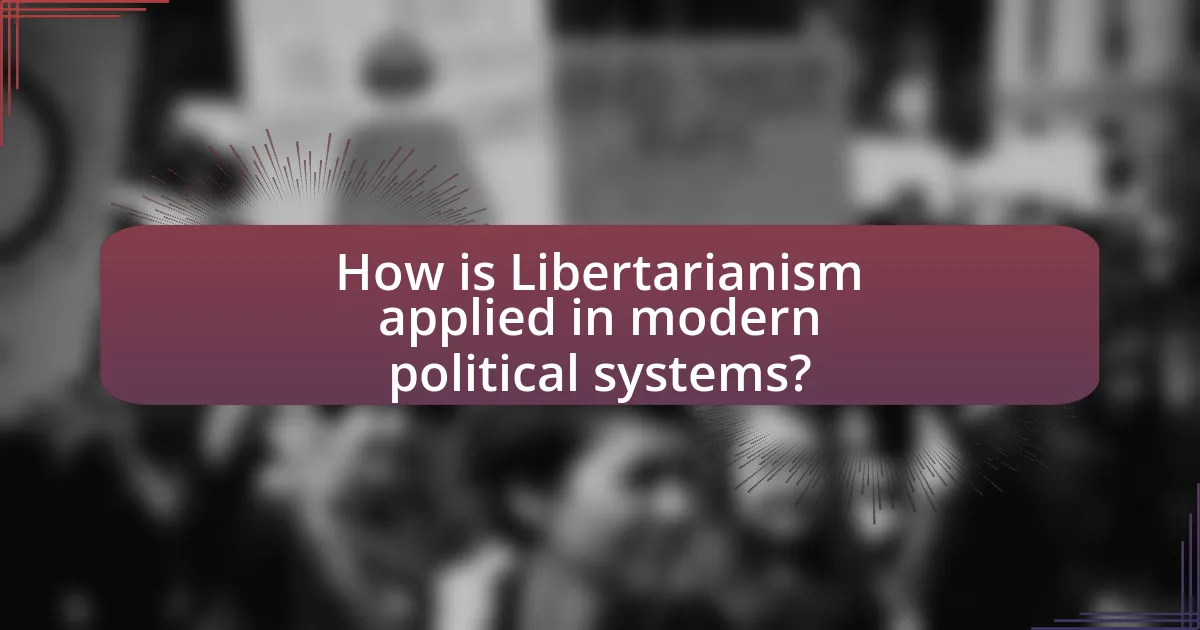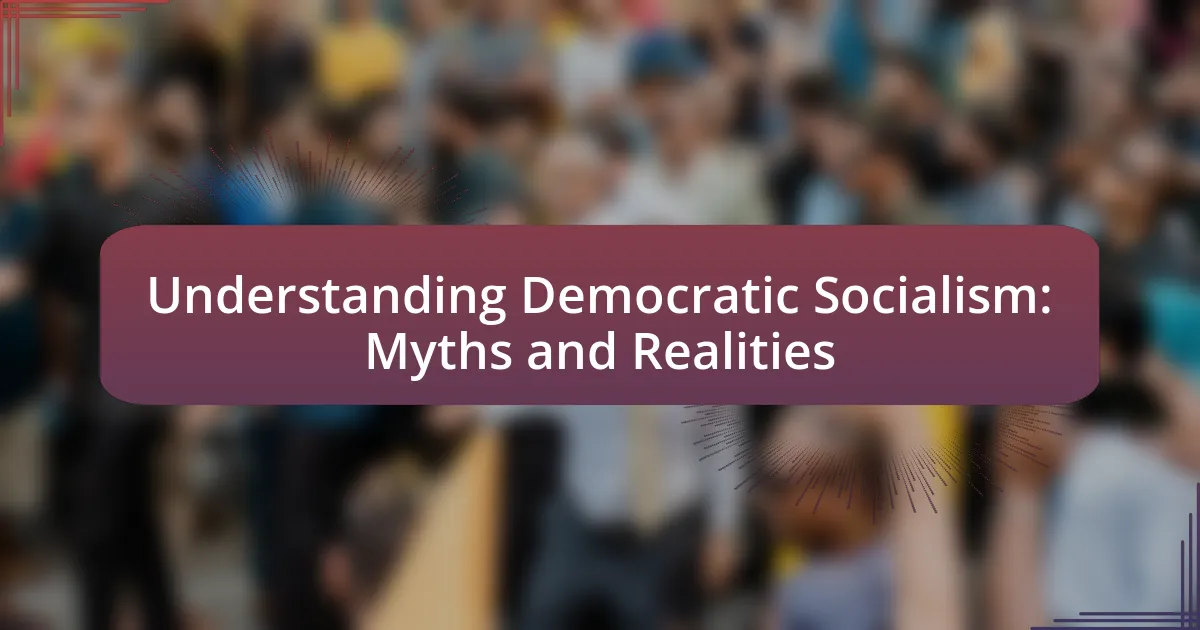The article explores the fundamental principles of Libertarianism, which include individual liberty, limited government, and free markets. It examines how these principles influence contemporary governance, emphasizing the role of individual freedom in shaping policies and legislation. The discussion highlights the significance of property rights, minimal state intervention, and the implications of taxation within Libertarian thought. Additionally, the article addresses the challenges Libertarianism faces in modern political systems, the interaction with other ideologies, and the impact of public opinion and economic conditions on the acceptance of Libertarian principles. Key examples of Libertarian policies in practice and their successes and failures are also analyzed, providing a comprehensive overview of Libertarianism’s role in contemporary governance.

What are the fundamental principles of Libertarianism?
The fundamental principles of Libertarianism are individual liberty, limited government, and free markets. Individual liberty emphasizes the right of individuals to make choices about their own lives without interference from others, particularly the state. Limited government advocates for a minimal state that exists primarily to protect individual rights, maintain order, and provide national defense, thereby reducing the scope of government intervention in personal and economic matters. Free markets promote voluntary exchange and competition, asserting that economic prosperity is best achieved when individuals are free to engage in trade without excessive regulation or control. These principles are rooted in classical liberalism and are supported by historical figures such as John Locke and Adam Smith, who argued for the importance of personal freedom and economic autonomy in fostering a prosperous society.
How do these principles influence contemporary governance?
Libertarian principles significantly influence contemporary governance by promoting individual liberty, limited government, and free markets. These principles advocate for minimal state intervention in personal and economic affairs, which shapes policies that prioritize personal responsibility and voluntary cooperation. For instance, countries that adopt libertarian policies often experience increased economic growth and innovation, as evidenced by the economic performance of nations with lower tax rates and fewer regulations, such as Singapore. Additionally, the emphasis on civil liberties and personal freedoms has led to reforms in areas like drug policy and criminal justice, reflecting a shift towards more progressive governance models that align with libertarian ideals.
What role does individual liberty play in Libertarian thought?
Individual liberty is central to Libertarian thought, serving as the foundational principle that prioritizes personal freedom and autonomy over collective control. Libertarians argue that individuals possess the right to make choices regarding their own lives, as long as those choices do not infringe on the rights of others. This emphasis on individual liberty is supported by the belief that a free society fosters innovation, prosperity, and personal responsibility. Historical documents, such as the U.S. Declaration of Independence, underscore the importance of individual rights, asserting that life, liberty, and the pursuit of happiness are inalienable rights. Thus, individual liberty is not only a core tenet of Libertarian philosophy but also a critical element in advocating for limited government intervention in personal and economic affairs.
How is property rights viewed within Libertarianism?
Property rights are viewed as fundamental within Libertarianism, serving as a cornerstone of individual freedom and autonomy. Libertarians assert that individuals have the right to acquire, own, and control property without interference from the state, as long as their actions do not infringe upon the rights of others. This perspective is rooted in the belief that property rights are essential for personal liberty, economic prosperity, and social order. Historical figures such as John Locke have influenced this view, arguing that property rights arise from an individual’s labor and investment in resources. Libertarians maintain that a free market, supported by strong property rights, leads to innovation and efficient resource allocation, ultimately benefiting society as a whole.
Why is limited government a core tenet of Libertarianism?
Limited government is a core tenet of Libertarianism because it emphasizes individual freedom and autonomy while minimizing state intervention in personal and economic matters. Libertarians argue that a government should exist primarily to protect individual rights, such as life, liberty, and property, rather than to control or regulate citizens’ lives. This principle is rooted in the belief that excessive government power leads to tyranny and infringes on personal freedoms. Historical examples, such as the founding principles of the United States, illustrate this tenet, as the framers sought to limit governmental authority to safeguard individual liberties.
What are the implications of minimal state intervention?
Minimal state intervention leads to increased individual freedom and personal responsibility. In a system with minimal government involvement, individuals have greater autonomy to make choices regarding their lives, businesses, and property. This can foster innovation and economic growth, as seen in countries with lower regulatory burdens, such as Singapore, which has consistently ranked high in economic freedom and competitiveness. Additionally, minimal intervention can result in reduced taxation, allowing individuals to retain more of their income, which can stimulate consumer spending and investment. However, it may also lead to challenges in addressing social inequalities and providing public goods, as the absence of state support can leave vulnerable populations without necessary resources.
How does Libertarianism address the concept of taxation?
Libertarianism fundamentally opposes taxation, viewing it as a form of coercion that infringes on individual liberty and property rights. Libertarians argue that taxation is equivalent to theft, as it involves the government forcibly taking a portion of an individual’s earnings without consent. This perspective is rooted in the belief that individuals should have the autonomy to manage their own resources without government interference. Prominent libertarian thinkers, such as Robert Nozick, have articulated that a just society should be based on voluntary exchanges and agreements rather than compulsory taxation. This stance is supported by the idea that minimal government intervention allows for greater personal freedom and economic efficiency.

How is Libertarianism applied in modern political systems?
Libertarianism is applied in modern political systems primarily through policies that emphasize individual liberty, minimal government intervention, and free markets. For instance, in the United States, the Libertarian Party advocates for reduced taxation, deregulation, and the protection of personal freedoms, reflecting core libertarian principles. Additionally, some state governments have implemented policies that align with libertarian ideals, such as criminal justice reform aimed at reducing incarceration rates for non-violent offenses and the legalization of marijuana, which promotes personal choice over government control. These applications demonstrate a growing influence of libertarian thought in shaping contemporary governance, as evidenced by increasing public support for individual rights and limited government.
What are the key examples of Libertarian policies in practice?
Key examples of Libertarian policies in practice include the legalization of marijuana, reduction of government regulations, and the promotion of free-market principles. For instance, states like Colorado and Washington have legalized recreational marijuana, reflecting Libertarian ideals of personal freedom and minimal government intervention. Additionally, Libertarian policies advocate for deregulation in various industries, which has been implemented in sectors such as telecommunications and transportation, leading to increased competition and consumer choice. Furthermore, the emphasis on free-market economics is evident in policies that reduce taxes and government spending, as seen in the tax reforms enacted in several states that aim to stimulate economic growth by allowing individuals to retain more of their income. These examples illustrate how Libertarian principles are applied in contemporary governance, promoting individual liberty and limited government.
How have Libertarian principles shaped recent legislation?
Libertarian principles have significantly influenced recent legislation by promoting individual liberties, reducing government intervention, and advocating for free markets. For instance, several states have enacted laws aimed at criminal justice reform, such as the decriminalization of marijuana, reflecting the Libertarian emphasis on personal choice and minimal state control. Additionally, the push for deregulation in various sectors, including telecommunications and transportation, aligns with Libertarian ideals that prioritize market solutions over government oversight. These legislative changes are supported by data indicating that states with more Libertarian policies often experience economic growth and increased personal freedoms, demonstrating the practical impact of these principles on governance.
What are the successes and failures of Libertarian governance?
Libertarian governance has seen both successes and failures. Successes include the promotion of individual freedoms and reduced government intervention, which can lead to increased economic growth and personal responsibility. For instance, in places like Hong Kong, low taxation and minimal regulation have contributed to significant economic prosperity, with a GDP per capita ranking among the highest globally. However, failures often manifest in social safety nets and public services, where reduced government involvement can lead to increased inequality and inadequate support for vulnerable populations. For example, in the United States, states with more libertarian policies, such as Texas, have faced challenges in healthcare access and education funding, highlighting the potential downsides of prioritizing minimal government.
How do Libertarian ideas interact with other political ideologies?
Libertarian ideas primarily advocate for individual liberty, limited government, and free markets, which interact with other political ideologies in various ways. For instance, libertarianism often contrasts sharply with socialism, which emphasizes collective ownership and government intervention in the economy; this fundamental difference leads to debates over the role of the state in economic affairs. Additionally, libertarian principles can align with classical liberalism, as both prioritize personal freedoms and economic liberty, but they diverge on the extent of government involvement in social issues. Furthermore, libertarianism can influence conservative ideologies by promoting fiscal responsibility and limited government, while also challenging certain social conservatism aspects that impose restrictions on personal behavior. These interactions illustrate the complex landscape of political thought where libertarianism both challenges and complements other ideologies, shaping contemporary governance discussions.
What are the common criticisms of Libertarianism from other political perspectives?
Common criticisms of Libertarianism from other political perspectives include the belief that it promotes inequality, undermines social justice, and neglects the role of government in providing public goods. Critics argue that Libertarianism’s emphasis on individual freedom and minimal government intervention can lead to a lack of support for essential services like healthcare and education, which are often seen as necessary for a fair society. Additionally, opponents contend that the focus on personal responsibility may ignore systemic issues that contribute to poverty and disadvantage, thereby perpetuating social inequalities. These criticisms are often supported by studies indicating that countries with stronger social safety nets tend to have better overall health and education outcomes, highlighting the potential downsides of a purely Libertarian approach.
How do Libertarians respond to these criticisms?
Libertarians respond to criticisms by emphasizing individual freedom and personal responsibility as foundational principles. They argue that government intervention often leads to inefficiencies and infringements on personal liberties, citing historical examples where increased regulation resulted in negative economic outcomes, such as the Great Depression, which they attribute in part to government overreach. Libertarians also contend that voluntary exchanges in a free market lead to better outcomes than those imposed by government mandates, supporting their position with evidence from economic studies that demonstrate the benefits of deregulation and competition.

What challenges does Libertarianism face in contemporary governance?
Libertarianism faces significant challenges in contemporary governance, primarily due to its emphasis on minimal state intervention, which can conflict with the need for collective action in areas like public health, infrastructure, and social welfare. For instance, during public health crises such as the COVID-19 pandemic, libertarian principles advocating for individual freedom can hinder effective government responses that require coordinated efforts and regulations to protect public safety. Additionally, the increasing complexity of modern economies necessitates regulatory frameworks that libertarianism often opposes, leading to tensions between market freedom and the need for oversight to prevent monopolies and ensure fair competition. These challenges highlight the difficulties libertarianism encounters in addressing contemporary societal issues that require a balance between individual liberties and collective responsibilities.
How do societal values impact the acceptance of Libertarian principles?
Societal values significantly influence the acceptance of Libertarian principles by shaping public perceptions of individual freedom, government intervention, and personal responsibility. In societies that prioritize individualism and personal autonomy, such as the United States, Libertarian principles tend to gain more traction, as evidenced by the increasing support for policies that advocate minimal government involvement in personal and economic matters. For instance, a 2020 Gallup poll indicated that 75% of Americans believe the government should not interfere in personal choices, aligning with Libertarian ideals. Conversely, in cultures that emphasize collectivism and social welfare, acceptance of Libertarian principles diminishes, as seen in many European countries where social safety nets are prioritized over individual liberties. This correlation between societal values and the acceptance of Libertarianism underscores the importance of cultural context in political ideology.
What role does public opinion play in shaping Libertarian policies?
Public opinion significantly influences the development of Libertarian policies by reflecting the values and preferences of the electorate. When a substantial portion of the public supports individual liberties, limited government, and free markets, Libertarian policymakers are more likely to advocate for these principles in legislation and public discourse. For instance, polling data from the Cato Institute indicates that a growing number of Americans favor reducing government intervention in personal and economic matters, which aligns with Libertarian ideals. This shift in public sentiment can lead to increased political support for Libertarian candidates and policies, ultimately shaping the legislative agenda and policy outcomes.
How do economic conditions affect the viability of Libertarian governance?
Economic conditions significantly influence the viability of Libertarian governance by determining the level of individual freedom and market efficiency. In prosperous economic environments, Libertarian principles thrive as individuals experience greater autonomy and opportunities for entrepreneurship, leading to minimal government intervention. Conversely, during economic downturns, the demand for government intervention increases, challenging the core Libertarian belief in limited government. Historical examples, such as the 2008 financial crisis, illustrate how economic instability prompted calls for regulatory measures, undermining Libertarian governance ideals. Thus, the economic context directly impacts the acceptance and implementation of Libertarian policies.
What strategies can Libertarians employ to promote their principles?
Libertarians can promote their principles through grassroots activism, educational initiatives, and strategic use of social media. Grassroots activism involves organizing local events, rallies, and community discussions to raise awareness about libertarian values such as individual liberty and limited government. Educational initiatives, including workshops, seminars, and distribution of literature, help inform the public about libertarian philosophy and policies. Additionally, leveraging social media platforms allows Libertarians to reach a broader audience, engage in discussions, and mobilize supporters effectively. These strategies have been shown to increase visibility and support for libertarian principles, as evidenced by the growth of libertarian organizations and increased participation in political processes.
How can Libertarians effectively communicate their ideas to the public?
Libertarians can effectively communicate their ideas to the public by utilizing clear messaging, engaging storytelling, and leveraging social media platforms. Clear messaging involves simplifying complex libertarian principles into relatable concepts, making them accessible to a broader audience. Engaging storytelling can illustrate real-life applications of libertarian ideas, such as personal freedom and economic liberty, which resonate with people’s everyday experiences. Social media platforms, with their vast reach, allow Libertarians to share their messages widely, engage in discussions, and respond to public concerns in real-time. Research indicates that effective communication strategies, including the use of narratives and digital engagement, significantly enhance public understanding and acceptance of political ideas.
What are best practices for implementing Libertarian policies in government?
Best practices for implementing Libertarian policies in government include reducing the size and scope of government, promoting individual liberties, and ensuring free markets. Reducing government size can be achieved by cutting unnecessary regulations and eliminating redundant agencies, which has been shown to enhance efficiency and accountability. Promoting individual liberties involves protecting personal freedoms and privacy rights, as evidenced by the success of policies that prioritize civil liberties in various states. Ensuring free markets requires minimizing government intervention in the economy, which can lead to increased innovation and competition, as demonstrated by historical examples such as the deregulation of the telecommunications industry in the 1990s, resulting in lower prices and improved services for consumers.





